新概念英语(55-64课)单词、短语
新概念英语第三册课文翻译及词汇Lesson55~57
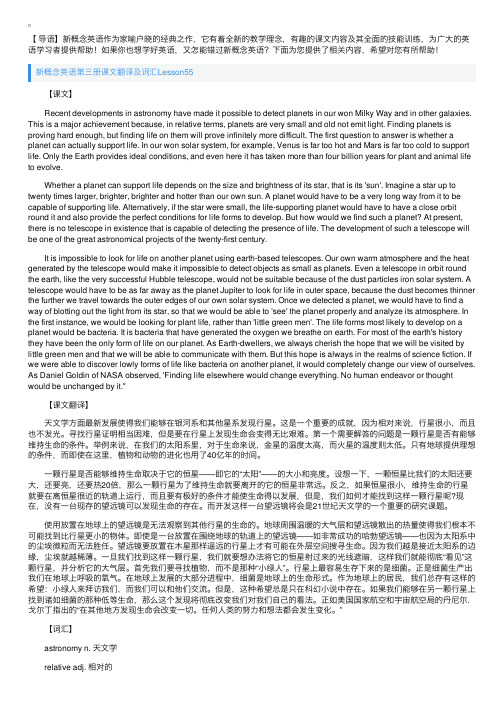
【导语】新概念英语作为家喻户晓的经典之作,它有着全新的教学理念,有趣的课⽂内容及其全⾯的技能训练,为⼴⼤的英语学习者提供帮助!如果你也想学好英语,⼜怎能错过新概念英语?下⾯为您提供了相关内容,希望对您有所帮助!新概念英语第三册课⽂翻译及词汇Lesson55 【课⽂】 Recent developments in astronomy have made it possible to detect planets in our won Milky Way and in other galaxies. This is a major achievement because, in relative terms, planets are very small and old not emit light. Finding planets is proving hard enough, but finding life on them will prove infinitely more difficult. The first question to answer is whether a planet can actually support life. In our won solar system, for example, Venus is far too hot and Mars is far too cold to support life. Only the Earth provides ideal conditions, and even here it has taken more than four billion years for plant and animal life to evolve. Whether a planet can support life depends on the size and brightness of its star, that is its 'sun'. Imagine a star up to twenty times larger, brighter, brighter and hotter than our own sun. A planet would have to be a very long way from it to be capable of supporting life. Alternatively, if the star were small, the life-supporting planet would have to have a close orbit round it and also provide the perfect conditions for life forms to develop. But how would we find such a planet? At present, there is no telescope in existence that is capable of detecting the presence of life. The development of such a telescope will be one of the great astronomical projects of the twenty-first century. It is impossible to look for life on another planet using earth-based telescopes. Our own warm atmosphere and the heat generated by the telescope would make it impossible to detect objects as small as planets. Even a telescope in orbit round the earth, like the very successful Hubble telescope, would not be suitable because of the dust particles iron solar system. A telescope would have to be as far away as the planet Jupiter to look for life in outer space, because the dust becomes thinner the further we travel towards the outer edges of our own solar system. Once we detected a planet, we would have to find a way of blotting out the light from its star, so that we would be able to 'see' the planet properly and analyze its atmosphere. In the first instance, we would be looking for plant life, rather than 'little green men'. The life forms most likely to develop on a planet would be bacteria. It is bacteria that have generated the oxygen we breathe on earth. For most of the earth's history they have been the only form of life on our planet. As Earth-dwellers, we always cherish the hope that we will be visited by little green men and that we will be able to communicate with them. But this hope is always in the realms of science fiction. If we were able to discover lowly forms of life like bacteria on another planet, it would completely change our view of ourselves. As Daniel Goldin of NASA observed, 'Finding life elsewhere would change everything. No human endeavor or thought would be unchanged by it." 【课⽂翻译】 天⽂学⽅⾯最新发展使得我们能够在银河系和其他星系发现⾏星。
新概念英语第二册55&56课
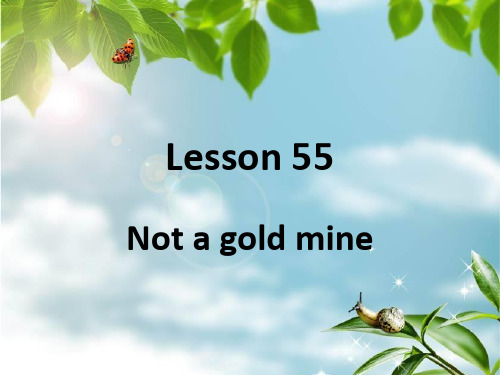
• smart adj. • 小巧而美丽的(物)或时髦而美丽的(人) • She is smart.她很时髦
• • • •
cute adj. 漂亮, 常用来形容小孩 What a cute baby!多漂亮的宝宝啊! How cute you are!你多可爱啊!
★explosion
n. 爆炸, 轰响
Lesson 55
Not a gold mine
gold n. 金子 • golden adj. 珍贵的,黄金般的 • a ______medal • a ______opportunity mine 矿 miner 矿工 • mineral矿物质 • mineral water 矿泉水 value n. 价值 • valueless adj. 无价值的=(worthless) • valuable adj. 有价值的 • something is valuable = something is of value • 某物有价值
过去进行时
• 过去进行时表示动作发生在过去的某个时间点, 常与表示过去的时间状语连用。 • 结构为:主语+was/ were+ 动词-ing...... • 常见的时间状语:at that time, at 3 o'clock yesterday, • 或者与when, while引导的过去时间状语连用。 e.g. 1.He was reading a book at that time. • 2.I was washing clothes at 5 o'clock yesterday. • 3.When I saw him, he was playing basketball.
• • • • • • •
新概念英语第二册单词表(课文顺序)直接打印版

序号 单词 34 abroad 35 pigeon 36 message 37 over 38 distance 39 request 40 spare 41 service 42 beggar 43 food 44 pocket 45 call 46 detective 47 airport 48 expect 49 valuable 50 parcel 51 diamond 52 steal 53 main 54 airfield 55 guard 56 precious 57 stone 58 sand 59 competition 60 neat 61 path 62 wooden 63 pool 64 welcome 65 crowd 66 gather
a.弱的
[ˌintə'rʌpt] v.插话,打断
[pɑ:k]
v.停放(汽车)
['træ fik]
n.交通
['tikit]
n.交通法规罚款单
[nəut]
n.便条
['eəriə]
n.地点
[sain]
n.指示牌
[ri'maində] n.指示
[feil]
v.无视,忘记
[ə'bei]
v.服从
[ə'piə]
v.登场,扮演
第 1 页,共 27 页
课次 Lesson001 Lesson001 Lesson001 Lesson001 Lesson001 Lesson001 Lesson001 Lesson001 Lesson001 Lesson001 Lesson001 Lesson001 Lesson002 Lesson002 Lesson002 Lesson002 Lesson002 Lesson003 Lesson003 Lesson003 Lesson003 Lesson003 Lesson003 Lesson003 Lesson003 Lesson003 Lesson003 Lesson003 Lesson004 Lesson004 Lesson004 Lesson004 Lesson004
《新概念英语》单词完整版

<< 新概念英语 1>> 1——5 课原谅我(宾格)是的 be 动词现在时第三人称单数这你的,你们的(女用)手提包原谅,请再说一遍它感你(们)非常地钢笔铅笔书手表上衣,外衣连衣裙裙子衬衣小汽车房子伞请这里我的票五对不起的先生衣帽存放处一套衣服学校老师儿子女儿先生好早晨小姐新的学生法国的,法国人德国的,德国人美好的遇见日本的,日本人国的,国人中国的,中国人也新概念英语 1 6—— 10 课牌号瑞典的英国的美国的意大利的沃尔沃标致梅赛德斯丰田大宇迷你福特菲亚特我 be 动词现在时第一人称单数 be 动词现在时复数名字什么国籍工作电脑键盘操作人员工程师警察女警察出租汽车司机空中小姐邮递员护士机械师理发师家庭妇女送牛奶的人喂(表示问候)喂,嗨怎样今天身体好美好的再见见胖的女人瘦的高的矮的脏的干净的热的冷的老的年轻的忙的懒的新概念英语 1 11 —— 15 课谁的蓝色的大概白色的抓住父亲母亲女衬衫姐,妹领带兄,弟他的她的颜色绿色来楼上漂亮的,时髦的帽子相同的可爱的,秀美动人的箱子地毯狗海关官员女孩,姑娘丹麦的,丹麦人朋友挪威的,挪威人护照棕色的旅游者新概念英语 1 16 —— 20 课俄罗斯的,俄罗斯人荷兰的,荷兰人这些( this 的复数)红色的灰色的黄色的黑色的橘黄色的雇员勤奋的推销员男人办公室助手事情孩子们( child 的复数)累,疲乏男孩渴妈妈(儿语)坐下好,可以冰淇淋大的小的开着的关着的轻的重的长的鞋子祖父,外祖父祖母,外祖母新概念英语 1 21 —— 25 课给一个哪一个空的满的大的小的尖的,锋利的小的大的钝的盒子,箱子杯子茶杯瓶子罐头刀子叉子勺子在⋯⋯之上架子,搁板课桌桌子盘子食橱香烟电视机地板梳妆台杂志床报纸立体声音响夫人厨房电冰箱右边带电的,可通电的左边炉子,炊具中间(属于)⋯⋯的房间杯子新概念英语 1 26 —— 30 课在哪里在⋯⋯里客厅靠近窗户扶手椅门图画墙(复数)长裤关门卧室乱,不整齐必须,应该打开使⋯⋯通风,换换空气放置衣服衣柜掸掉灰尘扫倒空,使⋯⋯变空读削尖,使锋利穿上脱掉开(电灯)关(电灯)新概念英语 1 31 —— 35 课花园在⋯⋯之下树爬,攀登谁跑草,草地在⋯⋯之后横过,穿过猫打字信篮子吃骨头清洗牙齿做(饭菜)牛奶饭,一顿饭喝(水)龙头日子云天空太阳照耀和⋯⋯在一起家庭(成员)走路,步行跨越,在⋯⋯之上桥船河轮船飞机飞睡觉刮脸哭,喊洗等跳照片村庄山谷在⋯⋯之间小山另一个妻子沿河岸水游泳大楼,建筑物公园进入新概念英语 1 36 —— 40 课在⋯⋯旁离开工作努力地做书橱,书架锤子上漆,涂粉红色,粉红色的最喜欢的作业听盘子,碟子前面在⋯⋯之前花小心的,仔细的花瓶掉下给⋯⋯看送给带给新概念英语 1 41 —— 45 课乳酪,干酪面包肥皂巧克力糖咖啡茶烟草,烟丝鸟一些一些当然水壶在⋯⋯后面茶壶现在,此刻找到沸腾,烧开能够老板,上司分(钟)请求,要求书写糟糕的,可怕的新概念英语 1 46 —— 50 课拿起,搬起,举起饼,蛋糕饼干喜欢,想要想新鲜的鸡蛋黄油纯净的蜂蜜成熟的香蕉果酱甜的橙格兰威士忌上等的,精选的苹果酒,果酒啤酒黑板卖肉者(食用)肉牛肉羔羊肉丈夫牛排肉馅鸡告诉实情也(用于否定句)西红柿土豆卷心菜莴苣豌豆豆角梨葡萄桃新概念英语 1 51 —— 55 课希腊气候国家宜人的天气春季有风的温暖的下雨有时夏天秋天冬天下雪 1 月2 月3 月 4月 5 月 6月 7 月 8月 9月10 月 11 月 12 月美国巴西荷兰英国法国德国意大利挪威俄罗斯西班牙瑞典温和的,温暖的总是北方潮湿的西方南方季节最夜晚升起早(太阳)落下去晚,迟有趣的,有意思的话题谈话澳大利亚澳大利亚人奥地利奥地利人加拿大加拿大人中国芬兰芬兰人印度印度人日本尼日利亚尼日利亚人土耳其土耳其人国波兰波兰人泰国人泰国生活呆在,停留在家,到家家务午饭下午通常一起晚上到达夜间新概念英语 1 56 —— 60 课点钟商店片刻,瞬间信封信纸售货员尺寸,尺码,大小信笺簿胶水粉笔零钱,找给的钱新概念英语 1 61 —— 65 课感觉看(起来)必须叫,请医生记得,记住嘴舌头坏的,严重的感冒消息头痛阿斯匹林耳痛牙痛牙医胃痛药温度流行性感冒麻疹腮腺炎形容词 well 的比较级当然起床还,仍油腻的食物保持,继续玩火柴谈话图书馆开车如此地快地身体探出打破喧闹声爸(儿语)钥匙婴儿听见玩得快活你自己我们自己妈妈新概念英语 1 66 —— 70 课我自己他们自己他自己她自己蔬菜水果零售商缺席的星期一星期二星期三星期四(身体健康)处于(状况)度过周末星期五星期六星期日乡村幸运的教堂乳品店面包师傅食品杂货商年比赛城镇人群站立使人激动的正好,恰好结尾,结束获胜者在⋯⋯之后路途文具商丹麦新概念英语 1 71 —— 75 课让人讨厌的,坏的打,次(数)接()最后的,前一次的又一次的说周伦敦突然地公共汽车站微笑愉快地懂,明白讲,说手衣袋穿着短语手册,常用语手册短语缓慢地匆忙地割,切口渴地走问候,打招呼以前买双,对(服装的)流行式样不舒服的新概念英语 1 76 —— 80 课约会,预约紧急的,急迫的直到⋯⋯为止购物单子蔬菜需要希望事物钱食品杂货水果文具报刊零售人药剂师新概念英语 1 81 —— 85 课洗澡几乎,将近准备好的,完好的正餐,晚餐饭馆,餐馆烤的早饭理发聚会假日杂乱,凌乱打包,装箱手提箱离开已经巴黎电影院电影漂亮的城市从来没有在任何时候新概念英语 1 86 —— 90 课接待员带来,送来车库,汽车修理厂碰撞灯杆,路灯柱修理努力,设法相信,认为(用于请求许可)可以多长自从为什么卖,出售因为退休花费英镑值⋯⋯钱便士新概念英语 1 91 —— 95 课还,仍旧搬家想念,思念邻居人人们可怜的飞行员返回纽约东京马德里飞行雅典柏林孟买日瓦莫斯科罗马首尔斯德哥尔摩悉尼往返火车站台大量酒吧车站,火车站乘务员赶上错过新概念英语 1 96—— 100 课遗留描述拉链标签提手,把手地址 penny 的复数形式属于哎呦滑到落下,跌倒下楼伤害,疼痛背起立,站起来帮助立即一定的,确信的X 光透视新概念英语 1 101—— 105 课格兰(英国)明信片青年招待所,旅馆协会不久写考试及格,通过数学问题容易的足够地考卷未及格,失败回答分数其他的东西困难的讨厌低的振作,振奋家伙,人上方,顶部聪明的笨的便宜的贵的新鲜的不新鲜的,变味的低的,矮的大声的高的硬的甜的软的酸的拼写聪明的,有智慧的错误礼物词典新概念英语 1 106—— 110带保存,保留改正,纠正夫人,女士(对妇女的尊称)漂亮的同样适于漂亮的主意少许一满茶匙( little 的比较级)较少的,更小的几个(用于可数名词之前)遗憾代替建议,忠告(many , much 的最高级)最多的( little 的最高级)最小的,最少的(good 的最高级)最好的( bad 的比较级)更坏的( bad 的最高级)最坏的课新概念英语 1 111 115 课型号,式样付得起(钱)预付定金分期付款价格百万富翁售票员车费,车票兑换(钱)纸币乘客没有任何东西也不下车流浪汉除⋯⋯外敲,打(用于疑问句、否定句)任何人一切事物宁静的,安静的不可能的邀请任何东西什么也没有柠檬水开玩笑新概念英语 1 116—— 120 课睡觉,睡着(用作表语)眼镜饭厅硬币嘴吞下后来厕所,盥洗室故事发生贼进入黑暗的手电筒(说话的)声音鹦鹉新概念英语 1 121—— 125 课顾客忘记经理照应,服务,接待柜台认出路在⋯⋯期间旅行提供工作猜长,让⋯⋯生长胡子,络腮胡子小猫浇水非常干燥的,干的讨厌的东西或人意味着,意思是惊奇,意外的事新概念英语 1 126 ——130 课立即地著名的女演员至少男演员通过阅读得知招手跑道英里从后面超越,超车限速做梦,思想不集中标记,牌子驾驶执照罚款亲爱的(用作表示称呼)新概念英语 1 131—— 135 课埃及国外担忧记者爆炸性的,耸人听闻的貂皮大衣未来的结婚饭店最新的介绍新概念英语 1 136—— 140 课足球赌注赢世界贫穷的依靠( on )额外的海外的,国外的工程公司线路新概念英语 1 141—— 144 课兴奋的登上中年的在⋯⋯对面好奇地可笑的,滑稽的香粉带镜的化妆盒和蔼地丑陋的有趣的微笑尴尬的,窘迫的担心的,担忧的经常地,定期地包围树林风景点百城市穿过参观者,游客,来访者整齐的杂乱的东西废物筐放扔,抛垃圾数,点覆盖碎片轮胎生锈的在⋯⋯之间依法处置。
新概念英语(汉译英)
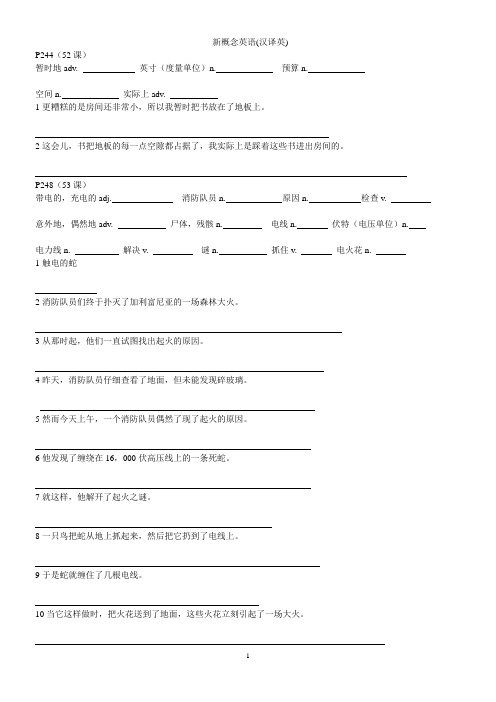
新概念英语(汉译英)P244(52课)暂时地adv. 英寸(度量单位)n. 预算n.空间n. 实际上adv.1更糟糕的是房间还非常小,所以我暂时把书放在了地板上。
2这会儿,书把地板的每一点空隙都占据了,我实际上是踩着这些书进出房间的。
P248(53课)带电的,充电的adj. 消防队员n. 原因n. 检查v.意外地,偶然地adv. 尸体,残骸n. 电线n. 伏特(电压单位)n.电力线n. 解决v. 谜n. 抓住v. 电火花n.1触电的蛇2消防队员们终于扑灭了加利富尼亚的一场森林大火。
3从那时起,他们一直试图找出起火的原因。
4昨天,消防队员仔细查看了地面,但未能发现碎玻璃。
5然而今天上午,一个消防队员偶然了现了起火的原因。
6他发现了缠绕在16,000伏高压线上的一条死蛇。
7就这样,他解开了起火之谜。
8一只鸟把蛇从地上抓起来,然后把它扔到了电线上。
9于是蛇就缠住了几根电线。
10当它这样做时,把火花送到了地面,这些火花立刻引起了一场大火。
P252(54课)黏的adj. 手指n. 馅饼n. 混合,拌合v. 面糊n. 恼人的adj. 电话的话筒n. 失望,泄气v. 认出,听出v. 说服,劝说v.乱七八糟n. 门把手n. 签字v. 挂号邮寄v.1于是我决定做些馅饼。
2不一会儿我就忙着调拌起了黄油和面粉,很快我的手上就粘满了黏黏的面粉。
3没有什么能比这更烦人了。
4我用两个粘满面糊的手指捏起了话筒。
5当我听出是海伦. 贝茨的声音时,非常丧气。
6我用了10分钟的时间才说服她过会儿再来电话。
7我终于挂上了话筒。
8真是糟糕透了!9我的手指上、电话机上以及门的把手上,都沾上了面糊。
10这次是邮递员,他要我签收一封挂号信!P256 (55课)金子n. 矿n. 财宝n. 探测器n. 发明v.探测v. 埋藏v. 山洞n. 海岸n. 海盗n. 武装v. 泥土n. 入口n. 最后毫无价值的adj. 彻底地adv.行李箱n. 有信心的adj. 价值n.1并非金矿。
(完整版)新概念英语第二册分课单词表_词汇表(完整版)
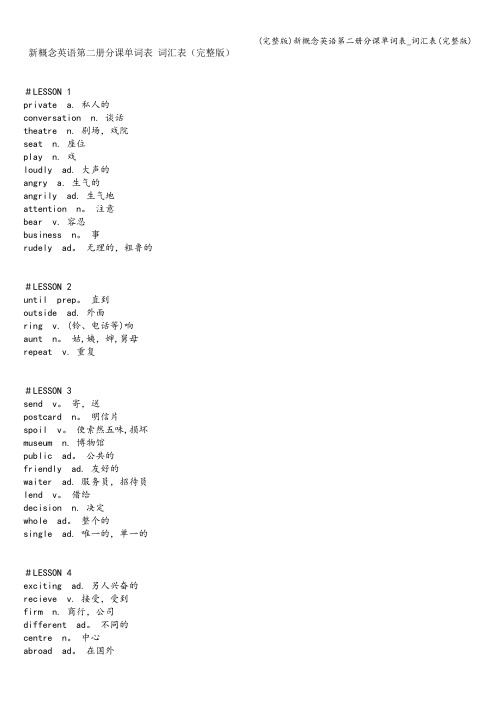
新概念英语第二册分课单词表词汇表(完整版)#LESSON 1private a. 私人的conversation n. 谈话theatre n. 剧场,戏院seat n. 座位play n. 戏loudly ad. 大声的angry a. 生气的angrily ad. 生气地attention n。
注意bear v. 容忍business n。
事rudely ad。
无理的,粗鲁的#LESSON 2until prep。
直到outside ad. 外面ring v. (铃、电话等)响aunt n。
姑,姨,婶,舅母repeat v. 重复#LESSON 3send v。
寄,送postcard n。
明信片spoil v。
使索然五味,损坏museum n. 博物馆public ad。
公共的friendly ad. 友好的waiter ad. 服务员,招待员lend v。
借给decision n. 决定whole ad。
整个的single ad. 唯一的,单一的#LESSON 4exciting ad. 另人兴奋的recieve v. 接受,受到firm n. 商行,公司different ad。
不同的centre n。
中心abroad ad。
在国外#LESSON 5pigeon n。
鸽子message n。
信息cover v。
越过distance n。
距离request n。
要求,请求spare part 备件service n. 业务,服务#LESSON 6beggar n。
乞丐food n. 食物pocket n. 衣服口袋call v. 拜访,光顾#LESSON 7detective n. 侦探airport n. 机场expect n. 期待,等待valuable ad。
贵重的parcel n。
包裹diamond n。
钻石steal v. 偷main ad。
主要的airfield n。
飞机起落的场地guard n. 警戒,守卫precious ad. 珍贵的stone n. 石子sand n。
裕兴新概念英语第二册笔记_第55课_课文讲解

裕兴新概念英语第二册笔记_第55课_课文讲解TextDreams of finding lost treasure almost came ture recently.of +ving 介词短语作后置定语修饰dreamsa girl of seventeen 十七岁的女孩a cost of bright color 颜色鲜艳的外套a vase of great value 一个很值钱的花瓶a distance of 18 miles 十八英里的路程eg 他的梦想实现了。
realize v 使…实现eg He realized his dream.他实现了他的梦想。
His dream was realized.他的梦想被实现了。
realized 是表示被动形式的which 引导一句话是定语从句修饰gold ,“被埋在地下的金子”be used to do eg This tool is used for cutting.这个仪器被用来砍东西。
eg This bottle is used to hold the medicine. 这个瓶子被用来装药的。
use up 用完;耗尽;(口)筋疲力尽be use up 筋疲力尽eg The soldiers were used up after the long battle. 长时间的战斗之后士兵们筋疲力尽。
used to do 过去常常做某事,过去的习惯动作或处于的状态eg We used to live in the city.be used to(perp 介词)+n/pron(代词)/doing (动名词)eg He is used to this kind of job . 他习惯于这种工作了。
become used to(perp 介词)+n/pron(代词)/doing (动名词)get used to(perp 介词)+n/pron(代词)/doing (动名词)eg You`ll soon get used to our way of living. 你很快会习惯我们的生活呢方式的eg I`m used to staying up late. 我习惯于熬夜了。
新概念英语单词表默写
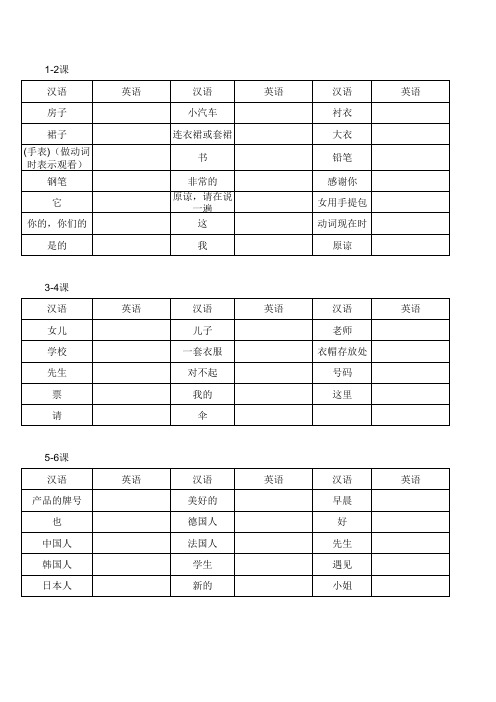
保存、保留 改正、纠正
携带
(107-108)
漂亮的 适于
五十五、(109- 110)
t(最坏的)(bad
的最高级)
(更坏的)(bad的
比较级)
(最好的) (good
的最高级)
(最小的、最少
的)(little的最高 级)
几个
聪明的 上方、顶部 家伙、人
振作 低 讨厌 困难的 其它的东西 分数
词典 礼物 错误
同样 漂亮的
(最多的)
(many,much 的最高级)
建议、忠告 代替
遗憾
回答 未及格、失
败 考卷 足够的 容易的 问题 数学(maths
缩写)
及格、通过 考试
聪明的、有 智慧的
拼写(原、 过去、过去
夫人、女士
较少的、
little比较级
一满茶匙 少许
主意
(111-112)
百万富翁 价格
(137-138)
依靠
贫穷的
(139-140)
线路 公司
(141-142)
经常地、定期 地
担心、担忧 尴尬的、窘迫
的 有趣的 丑陋的
(143-144)
依法处置
在...之间
生锈的 轮胎 碎片 覆盖
数、点
世界 赢(原、过去 式、过去分
词))
工程 海外的、国外
的
和蔼的 戴镜的化妆盒 可笑的、滑稽
的 香粉
汉语 他/她的
兄弟 领带 姐妹
英语
汉语 空中小姐 出租汽车司机
女警 警察 工程师 操作人员
英语
英语
汉语 矮的 高的 瘦的 女人 胖的 见 再见
英语
裕兴新概念英语第二册笔记_第64课_单词讲解
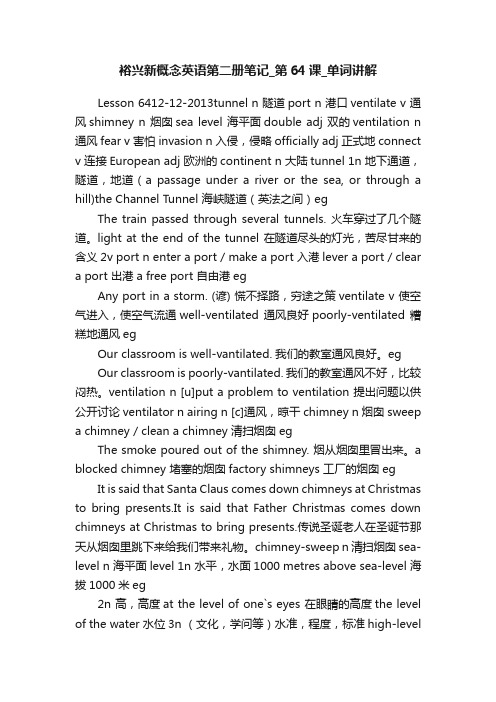
裕兴新概念英语第二册笔记_第64课_单词讲解Lesson 6412-12-2013tunnel n 隧道port n 港口ventilate v 通风shimney n 烟囱sea level 海平面double adj 双的ventilation n 通风fear v 害怕invasion n 入侵,侵略officially adj 正式地connect v 连接European adj 欧洲的continent n 大陆tunnel 1n 地下通道,隧道,地道(a passage under a river or the sea, or through a hill)the Channel Tunnel 海峡隧道(英法之间)egThe train passed through several tunnels. 火车穿过了几个隧道。
light at the end of the tunnel 在隧道尽头的灯光,苦尽甘来的含义2v port n enter a port / make a port 入港lever a port / clear a port 出港a free port 自由港egAny port in a storm. (谚) 慌不择路,穷途之策ventilate v 使空气进入,使空气流通well-ventilated 通风良好poorly-ventilated 糟糕地通风egOur classroom is well-vantilated. 我们的教室通风良好。
egOur classroom is poorly-vantilated. 我们的教室通风不好,比较闷热。
ventilation n [u]put a problem to ventilation 提出问题以供公开讨论ventilator n airing n [c]通风,晾干chimney n 烟囱sweep a chimney / clean a chimney 清扫烟囱egThe smoke poured out of the shimney. 烟从烟囱里冒出来。
2019新概念英语第二册Lesson55生词和短语

【导语】新概念英语⽂章短⼩精悍,语句幽默诙谐,语法全⾯系统。
适合各个阶层的⼈群学习参考。
相信有了新概念英语,你也可以成为“⼤神”级别的⼈物!还在等什么?快来加⼊学习吧!⼩编与您⼀起学习进步! Newwordsandexpressions⽣词和短语 gold(title)/gəuld/n.⾦⼦ arm(1.6)/a:m/v.武装 mine(title)/main/n.矿 soil(1.8)/sɔil/n.泥⼟ treasure(1.1)/'treʒə/n.财宝 entrance(1.8)/'entrəns/n.⼊⼝ revealer(1.2)/ri'vi:lə/n.探测器 finally(1.10)/'fainəli/adv.最后 invent(1.2)/In'vent/v.发明 worthless(1.10)/'wə:θləs/adj.毫⽆价值的 detect(1.3)/di'tekt/v.探测 thoroughly(1.10)/'θʌrәli/adv.彻底地 bury(1.3)/'beri/v.埋藏 trunk(1.11)/trʌŋk/n.⾏李箱 cave(1.4)/keiv/n.⼭洞 confident(1.11)/'kɔnfidənt/adj.有信⼼的 seashore(1.4)/'si:'ʃɔ:/n.海岸 value(1.12)/'vælju:/n.价值 pirate(1.5)/'paiərət/n.海盗 《新概念英语》是1997年由外语教学与研究出版社和培⽣教育出版中国有限公司联合出版的⼀套英语教材。
作为⼀套世界闻名的英语教程,以其全新的教学理念,有趣的课⽂内容和全⾯的技能训练,深受⼴⼤英语学习者的欢迎和喜爱。
进⼊中国以后,《新概念英语》历经数次重印,以限度地满⾜不同层次、不同类型英语学习者的需求。
新概念英语第一册55-56课详解

新概念英语第一册55-56课详解Lesson 55-56 of New Concept English Book 1 Detailed Explanation.Lesson 55: The Sawyer Family.Vocabulary and Expressions:live [lɪv] v.: This verb has multiple meanings. Firstly, it can mean to reside or habitually inhabit a place. For example, "I live in Hefei." Secondly, it can mean to exist or be alive, as in "People cannot live without air." Lastly, it can be used in the expression "live a/an... life" to describe the way someone lives their life.stay [steɪ] v.: This Verb primarily means to remain in a place for a period of time. It can also be used figuratively to mean "remain" in a certain state or condition, as in "stay hungry, stay foolish."home [həʊm] n./adv.: As a noun, it refers to the place where one lives. As an adverb, it means "to the place where one lives," as in "go home."housework ['haʊswɜːk] n.: This noun refers to the tasks related to maintaining a household, such as cleaning, cooking, and laundry.lunch [lʌnʃ] n.: This noun refers to the meal eaten in the middle of the day.afternoon [ɑːftə'nuːn] n.: This noun refers to the period of time between noon and evening.Text Explanation:Lesson 55 introduces the Sawyer family and their daily routine. The lesson begins by introducing the family members and their occupations. Mr. Sawyer works in an office, while Mrs. Sawyer stays at home. The children go to school. The lesson then goes on to describe their eveningactivities. Mr. Sawyer usually arrives home from work at about five o'clock, and the family then has their lunch together. In the afternoon, they often have a rest, andthen in the evening, they usually stay at home and watch television.Grammar Points:The use of "-s" or "-es" to form the third-person singular present tense of verbs is reinforced in this lesson. For example, "Mr. Sawyer usually arrives home from work at about five o'clock."The use of prepositions with "live" is also introduced. For example, "Mr. Sawyer lives in a town near London,"where "in" is used with a large place, and "Mrs. Sawyerlives at 87 King Street," where "at" is used with aspecific address.Lesson 56: What Do They Do?Vocabulary and Expressions:together [tə'geðə] adv.: This adverb means "in a group" or "side by side."evening ['iːvnɪŋ] n.: This noun refers to the time of day that comes after afternoon and before night.arrive [ə'raɪv] v.: This Verb means to reach a destination after a journey.night [naɪt] n.: This noun refers to the period of time from sunset to sunrise.Text Explanation:Lesson 56 continues the theme of the Sawyer family's daily life by asking the question, "What do they do?" The lesson provides information about the family's evening activities. Mr. Sawyer usually arrives home from work at about five o'clock, and then the family has their tea together. After tea, they usually sit in the living room and watch television. Sometimes, they go to the cinema orto the theater. On Sundays, they often go for a walk in the park.Grammar Points:The present tense of verbs is reinforced in this lesson, particularly the use of the third-person singular form.The lesson also introduces the use of modal verbs such as "can" and "usually" to express ability and frequency.Conclusion:Lessons 55 and 56 of New Concept English Book 1 focus on the Sawyer family's daily routine and activities. These lessons introduce new vocabulary and expressions related to family life, daily activities, and grammar points such as the use of "-s" or "-es" in the third-person singular present tense and the use of modal verbs. By learning these lessons, students can improve their understanding of family life in English-speaking countries and enhance theirlanguage skills in areas such as vocabulary, grammar, and comprehension.。
新概念英语55-60课复习

灰太狼级别
下一关关
名词变复数
1.一般在名词后面加上“s”: book→books, bag→bags 2.以s, x, sh, ch,等结尾的词加“es”: bus→buses, watch→watches 3.以辅音字母+y结尾的词,变y为i加es, baby→babies 以元音字母+ y结尾的名词变复数时, 直接加s变复数,boy →boys 4.以f或fe结尾的名词变复数时,改f或fe为v再 加es , wolf-wolves
some any都可以修饰可数名词
Make sentences
• • • • •
我有一些零钱。 你有一些信纸。 他们有一瓶胶水。 他有些大号的便笺簿。 Lily有一小盒粉笔。
• 我有一些零钱。 I have some change. • 你有一些信纸。 You have some writing paper. • 他们有一瓶胶水。 They have a bottle of glue. • 他有些大号的便笺簿。 He has some large size pads. • Lily有一小盒粉笔。 Lily has a small box of chalk.
4. Her brother _____(study) very hard.
key: studies
5.Liu Tao _______(do) not like PE.
key:does
5.The boy _______ (draw) a picture now. key: is cooking 6.Look! They ____ (have) an English lesson. key: are having 7.Listen! Some girls ____ (sing) in the room. key: are singing 8. What are you doing? I_____ (run). key: am running
新概念英语(55-64课)单词、短语

信纸
get up
起床
shop assistant
售货员
yet
还,仍
size
尺寸,尺码,大小
rich
油腻的;富有的
the large size
大号
food
食物
the small size
小号
remain
保持,继续
pad
信笺簿,小垫子
play
玩
glue
胶水
match
火柴(可数);比赛
chalk
粉笔(不可数)
talk
谈话,交谈(双方)
change
v.改变;n.零钱,找给的钱
library
图书馆
feel
感觉
drive
开车
look
看(起来)
so
如此地
must
必须
quickly
快地
call
叫,请
lean out of
身体探出
doctor
医生
break
打破、课间休息
telephone
电话
新概念英语(55-64课)单词、短语
英语
汉语
英语
汉语
live
住,生活
medicine
药(不可数)
stay
呆在,停留
bad
坏的,严重的
home
家;在家,到家
flu
流行性感冒
housework
家务(不可数)
cold
感冒
lunch
午饭
a bad cold
重感冒
afternoon
下午
have a bad cold
概念英语英语单词词组句子
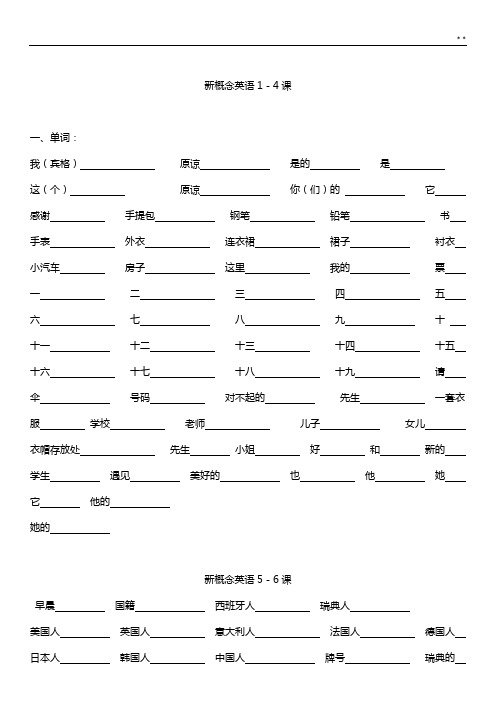
新概念英语1-4课一、单词:我(宾格)原谅是的是这(个)原谅你(们)的它感谢手提包钢笔铅笔书手表外衣连衣裙裙子衬衣小汽车房子这里我的票一二三四五六七八九十十一十二十三十四十五十六十七十八十九请伞号码对不起的先生一套衣服学校老师儿子女儿衣帽存放处先生小姐好和新的学生遇见美好的也他她它他的她的新概念英语5-6课早晨国籍西班牙人瑞典人美国人英国人意大利人法国人德国人日本人韩国人中国人牌号瑞典的英国的美国的意大利的迷你一、下列单词只要求会读沃尔沃Volvo 标致Peugeot 丰田Toyota 大宇Daewoo 福特Ford 菲亚特Fiat 梅赛德斯Mercedes新概念英语7-8课一、单词:我是(与我连用)是(复数)名字什么工作护士电脑键盘操作人员工程师警察女警察空中小姐邮递员机械师理发师家庭妇女送牛奶的人出租车司机二、代词:新概念英语9-10课一、单词:喂(打招呼)怎样今天好(身体)美好的见谢谢非常再见胖的瘦的高的矮的脏的干净的热的冷的老的年青的忙的懒的男人女人新概念英语11-12课一、单词:谁的大概白色的蓝色的父亲母亲姐妹兄弟领带女衬衫外套长裙短裙套装抓住那个书包雨伞新概念英语13-14课一、单词:颜色绿色灰色红色黄色桔黄色黑色帽子衬衫相同的可爱的时髦的箱子地毯楼上小轿车美好的狗看见看来三、常用表达:1、过来看一看!2、同样的颜色3、在这儿。
新概念英语15-16课一、单词:官员海关女孩朋友我们他们护照箱子票这些套装二十三十四十五十六十七十八十九十一百旅游者丹麦人俄罗斯人荷兰人挪威人海关官员新概念英语17-18课一、单词:男人雇员工作懒惰的那些助手非常繁忙的办公室推销员勤奋的空中小姐家庭妇女邮递员电脑录入员出租车司机办公室的勤杂人员新概念英语19-20课一、单词:鞋子事情男孩坐下可以累渴大的小的关着的开着的轻的重的冰淇淋孩子们祖父祖母二、词组:坐下好新概念英语21-22课一、单词:满的空的尖的钝的小的盒子杯子茶杯瓶子罐头刀子叉子勺子给一个哪一个二、反义词:Dirty--- empty--- large--- sharp--- new--- young--- big—三、词组:Give sb. sth.=give sth. to sb.新概念英语23-24课一、单词:在…上架子课桌桌子盘子地板床椅子这些那些碗橱杂志报纸香烟立体声音响梳妆台电视机二、词组:在架子上新概念英语25-26课一、单词:夫人厨房炉子瓶子地板锋利的左边右边中间……的房间在哪里带电的电冰箱在…里二、词组:在厨房在左边在右边在……的中间新概念英语27-28课一、单词窗户靠近扶手椅门长裤墙图画报纸客厅二、词组:梳妆台在桌子附近在墙上新概念英语29-30课一、单词:关门打开通风扫放置掸灰尘读倒空必须削尖衣服水龙头乱大衣柜卧室二、词组:进来关门开窗通风铺床扫地穿上脱下打开关掉掸掉梳妆台上的灰尘新概念英语31-32课一、单词:树草谁爬跑花园猫吃信坐下骨头牙齿清洗做饭牛奶原谅打字横过篮子一顿饭在…之下在…之后二、词组:爬树怎么样追赶打信件看图画刷牙看杂志喝牛奶做饭新概念英语33-34课一、单词:日子云太阳天空和照耀妻子走路船桥轮船河飞今天洗刮脸哭睡觉等跳飞机在…之上家庭二、词组:在天上在桥上在河上看新概念英语35-36课一、单词:小山河岸妻子公园离开水进入游泳左边沿着越过照片村庄山谷大楼另一个在…旁在旁边在…这间二、词组:邻近小河在左边在右边在…之外进入新概念英语37-38课一、单词:工作努力地做涂听粉红色刮脸等待碟子锤子作业书橱立体声音响最喜欢的二、词组:努力工作做书架什么颜色等待做作业听洗盘子给你新概念英语39-40课一、单词花瓶前面掉下花送给给…看带给用放架子小心的二、词组:把…给…在…之前小心穿上脱下打开头上最后新概念英语41-42课一、单词:乳酪面包糖咖啡茶肥皂重的鸟一些(肯定句)片一些(否定句)一条一块瓶听一半领带勺子巧克力烟草1/4 护照磅二、词组:一片一条一块一瓶一磅半磅一听新概念英语43-44课一、单词:水壶茶壶现在找到沸腾快的在…的后面二、词组:沏茶当然在那边快点新概念英语45-46课一、单词:能够老板请求跳举起蛋糕先生饼干打字办公室离开刷、涂杂志书写糟糕的分钟二、词组:过来隔壁当然做蛋糕新概念英语47-48课一、单词:喜欢想鸡蛋黄油果酱蜂蜜苹果酒啤酒橙糖咖啡新鲜的纯净的成熟的甜的精选的黑板香蕉苏格兰威士忌二、词组:一杯飞过走过新概念英语49-50课一单词:也(用于否定西红柿土豆卷心菜莴苣肉牛肉牛排羔羊肉豌豆肉馅梨鸡卖肉的莴苣豆角葡萄桃实情还是也告诉卷心菜西红柿土豆丈夫二词组:在肉店怎么样说实话新概念英语51-52课一单词:希腊气候国家宜人的天气春季有风的温暖的下雨有时夏天秋天冬天下雪一月二月三月四月五月六月七月八月九月十月十一月十二月美国巴西荷兰英国法国德国意大利挪威俄罗斯西班牙瑞典二词组来自_________ 每一天________ 在春天_________你来自哪里?_________________________________________________?你们国家气候怎么样?____________________________________________?新概念英语53-54课温和的总是北方东方潮湿的西方南方季节最夜晚升起早落下去晚有趣的话题谈话澳大利亚澳大利亚人奥地利奥地利人加拿大加拿大人中国芬兰芬兰人印度印度人日本尼日利亚尼日利亚人土耳其土耳其人韩国波兰波兰人泰国泰国人国家国籍首字母大写新概念英语55-56课生活呆在在家家务午饭下午通常一起晚上到达夜间新概念英语57-58课点钟商店片刻信封信纸售货员尺寸信签簿胶水粉笔零钱新概念英语61—62课一、单词:感觉看叫必须出示医生星期牙医坏的嘴消息舌头感冒麻疹头痛耳疼牙痛流行性感冒腮腺炎记得胃痛事件电话药温度阿司匹林二、短语:叫医生看病电话号码张开嘴呆在床上一周吃阿司匹林吃药三、句子:1、他怎么了?2、他病了。
新概念英语第一册Lesson55_64课文注释
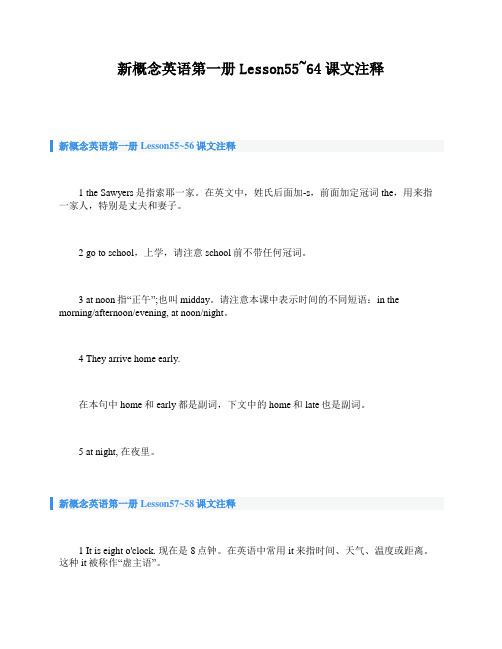
新概念英语第一册Lesson55~64课文注释新概念英语第一册Lesson55~56课文注释1 the Sawyers是指索耶一家。
在英文中,姓氏后面加-s,前面加定冠词the,用来指一家人,特别是丈夫和妻子。
2 go to school,上学,请注意school前不带任何冠词。
3 at noon指“正午”;也叫midday。
请注意本课中表示时间的不同短语:in the morning/afternoon/evening, at noon/night。
4 They arrive home early.在本句中home和early都是副词,下文中的home和late也是副词。
5 at night, 在夜里。
新概念英语第一册Lesson57~58课文注释1 It is eight o'clock. 现在是8点钟。
在英语中常用it来指时间、天气、温度或距离。
这种it被称作“虚主语”。
2 by car,乘汽车。
on foot,步行。
这两个状语短语均用来表示方式。
3 at the moment,指眼前,“此刻”。
新概念英语第一册Lesson59~60课文注释1 Do you want the large size or the small size?这句话是选择疑问句,逗号前的size读升调,后者读降调。
2 I only have large ones.句中的ones指pads。
3 What else do you want? 您还要什么吗?其中的What else…? 可以看作是表示疑问的一个短语,意思是:“还有什么吗?”新概念英语第一册Lesson61~62课文注释1 What's the matter with him? 他怎么啦?What's the matter with…? 常用来询问人或事物的状况,常作“是否有问题?”“是否有麻烦”讲。
2 feel ill,觉得病了,feel是系动词,ill是表语。
新概念英语第二册笔记-第64课

Lesson 64 The Channel Tunnel 海峡隧道【Text】In 1858, a French engineer, Aime Thome de Gamond, arrived in England with a plan for a twenty-one-mile tunnel under the English Channel. He said that it would be possible to build a platform in the centre of the Channel. This platform would serve as a port and a railway station. The tunnel would be well-ventilated if tall chimneys were built above sea level. In 1860, a better plan was put forward by an Englishman, William Low. He suggested that a double railway-tunnel should be built. This would solve the problem of ventilation, for if a train entered this tunnel, it would draw in fresh air behind it. Forty-two years later a tunnel was actually begun. If, at the time, the British had not feared invasion, it would have been completed. The world had to wait almost another 100 years for the Channel Tunnel. It was officially opened on March 7,1994, finally connecting Britain to the European continent.【课文翻译】1858年,一位名叫埃梅.托梅.德.干蒙的法国工程师带着建造一条长21英里、穿越英吉利海陕的隧道计划到了英国。
新概念英语第二册Lesson55~57单词学习
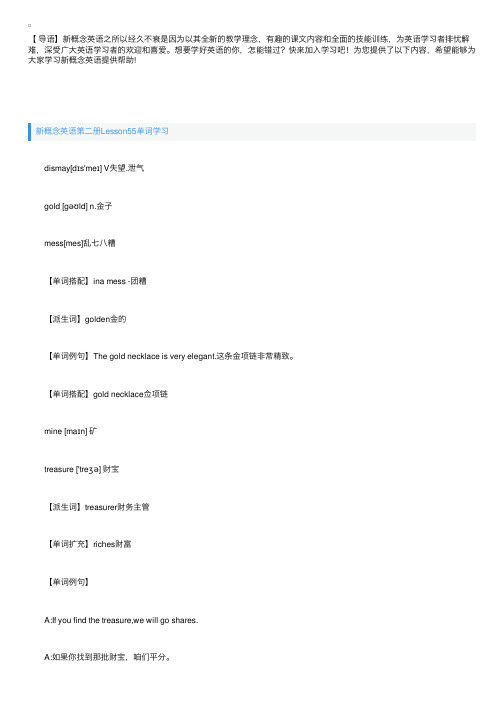
【导语】新概念英语之所以经久不衰是因为以其全新的教学理念,有趣的课⽂内容和全⾯的技能训练,为英语学习者排忧解难,深受⼴⼤英语学习者的欢迎和喜爱。
想要学好英语的你,怎能错过?快来加⼊学习吧!为您提供了以下内容,希望能够为⼤家学习新概念英语提供帮助!新概念英语第⼆册Lesson55单词学习 dismay[dɪs'meɪ] V失望.泄⽓ gold [gəʊld] n.⾦⼦ mess[mes]乱七⼋糟 【单词搭配】ina mess -团糟 【派⽣词】golden⾦的 【单词例句】The gold necklace is very elegant.这条⾦项链⾮常精致。
【单词搭配】gold necklace佥项链 mine [maɪn] 矿 treasure ['treʒə] 财宝 【派⽣词】treasurer财务主管 【单词扩充】riches财富 【单词例句】 A:If you find the treasure,we will go shares. A:如果你找到那批财宝,咱们平分。
B:It's a deal. B:就这么定了。
revealer [ri'vi:lə] 探测器 invent [ɪn'vent] V发明 【派⽣词】invention发明 【单词扩充】contrive发明 【单词例句】 A: Do you know who invented this object? A:你知道这是谁发明的吗? B:I don't know that. B:我不知道。
detect [dɪ'tekt] V探测 bury ['berɪ] v埋藏 【单词例句】 A: Diga pit and bury the box. A:挖⼀个坑把这个盒⼦埋了。
B:I don't think it's safe, either. B:我觉得这样也不安全。
新概念英语第二册Lesson55~57课文注释
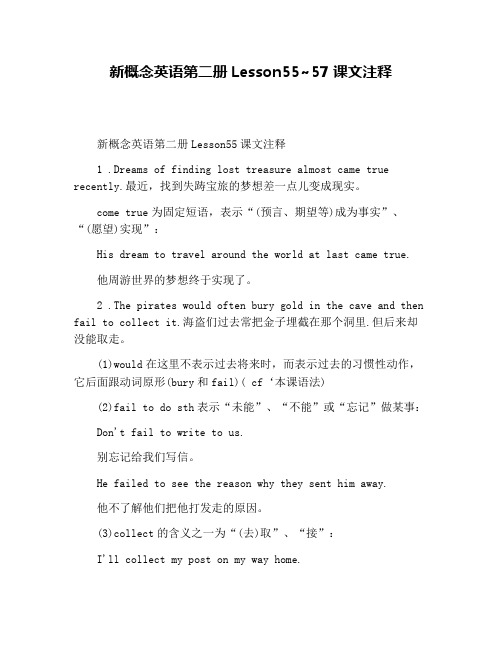
新概念英语第二册Lesson55~57课文注释新概念英语第二册Lesson55课文注释1 .Dreams of finding lost treasure almost came true recently.最近,找到失踌宝旅的梦想差一点儿变成现实。
come true为固定短语,表示“(预言、期望等)成为事实”、“(愿望)实现”:His dream to travel around the world at last came true.他周游世界的梦想终于实现了。
2 .The pirates would often bury gold in the cave and then fail to collect it.海盗们过去常把金子埋截在那个洞里.但后来却没能取走。
(1)would在这里不表示过去将来时,而表示过去的习惯性动作,它后面跟动词原形(bury和fail)( cf‘本课语法)(2)fail to do sth表示“未能”、“不能”或“忘记”做某事:Don't fail to write to us.别忘记给我们写信。
He failed to see the reason why they sent him away.他不了解他们把他打发走的原因。
(3)collect的含义之一为“(去)取”、“接”:I'll collect my post on my way home.我将在回家时顺路取我的邮件。
Don't fail to collect me before you go to the party.去参加晚会之前别忘了接我。
3. Armed with the new machine…用这种新机器装备起来...arm(ed) with能够表示“带着”、“装着”、“穿着”等:Don't worry.I'm armed with an umbrella.别担心,我带着伞呢。
- 1、下载文档前请自行甄别文档内容的完整性,平台不提供额外的编辑、内容补充、找答案等附加服务。
- 2、"仅部分预览"的文档,不可在线预览部分如存在完整性等问题,可反馈申请退款(可完整预览的文档不适用该条件!)。
- 3、如文档侵犯您的权益,请联系客服反馈,我们会尽快为您处理(人工客服工作时间:9:00-18:30)。
usually
通常
news
消息
together
一起
a piece of news
一条消息
evening
晚上
headache
头痛
arrive
到达
earache
耳痛
night
夜间
toothache
牙痛
in the morning
在上午
stomachache
胃痛
in the afternoon
在下午
新概念英语(55-64课)单词、短语
英语
汉语
英语
汉语
live
住,生活
medicine
药(不可数)
stay
呆在,停留
bad
坏的,严重的
home
家;在家,到家
flu
流行性感冒
housework
家务(不可数)
cold
感冒
lunch
午饭
a bad cold
重感冒
afternoon
下午
have a bad cold
chalk
粉笔(不可数)
talk
谈话,交谈(双方)
change
v.改变;n.零钱,找给的钱
library
图书馆
feel
感觉
drive
开车
look
看(起来)
so
如此地
must
必须
quickly
快地
call
叫,请
lean out of
身体探出
doctor
医生
break
打破、课间休息
telephone
电话
noise
喧闹声
remember
记得,记住
aspirin
阿斯匹林
mouth
嘴
tongue
舌头
measles
麻疹
in the evening
在晚上
mumps
腮腺炎
at noon
在中午
dentist
牙医
at night
在夜间
temperature
温度
o’clock
只用整点钟
havea headache\
temperature\earache\
toothache\stomach ache
得了头痛、发烧、耳痛、牙痛、胃痛
writing paper
信纸
get up
起床
shop assistant
售货员
yet
还,仍
size
尺寸,尺码,大小
rich
油腻的;富有的
the large size
大号
food
食物
the small size小号remain保持,继续
pad
信笺簿,小垫子
play
玩
glue
胶水
match
火柴(可数);比赛
shop
商店
takean aspirin
吃阿斯匹林
moment
片刻,瞬间
seea dentist
看牙医
at the moment
此时此刻
have flu\measles\mumps
得了流行性感冒、麻疹、腮腺炎
on foot
步行
better
形容词well的比较级
envelope
信封
certainly
当然
